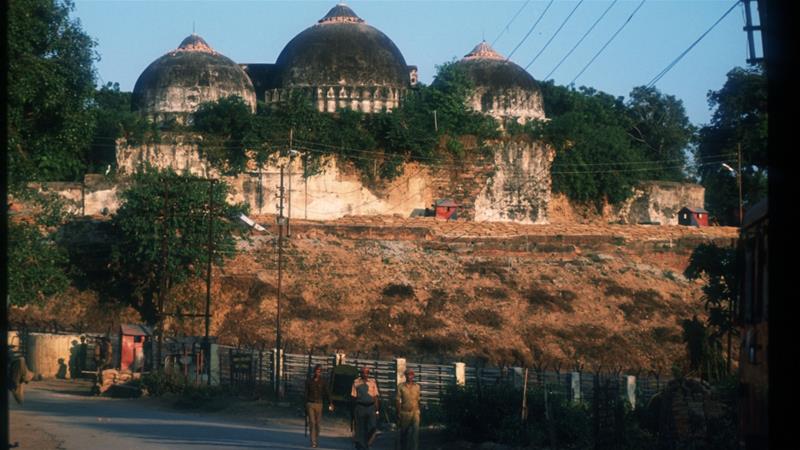Tight security in Ayodhya ahead of Babri mosque-Ram temple ruling
Public gatherings, drones banned in northern Indian city, as Supreme Court prepares for verdict in coming weeks.
India has barred public gatherings amid tightened security restrictions in the northern Indian town of Ayodhya ahead of a crucial Supreme Court ruling over a disputed site fiercely contested between Hindus and Muslims.
India’s top court started hearing final arguments on Monday to decide whether a Hindu temple should be built on the ruins of 16th-century Babri mosque in Ayodhya, a city in Uttar Pradesh state.
The razing of Babri mosque by Hindu mobs in 1992 led to one of India’s deadliest bouts of communal riots, in which at least 2,000 people, most of them Muslim, were killed across the country.
Hindu groups believe the site is the birthplace of Lord Ram and have intensified calls for a temple to be built there under Prime Minister Narendra Modi’s Hindu nationalist government.
The Supreme Court is expected to conclude on October 17 hearings into appeals against a key 2010 court ruling that both groups should split the site, with Hindus granted the lion’s share. A verdict is expected before Chief Justice Ranjan Gogoi retires on November 17.
Authorities have imposed an emergency law in Ayodhya under which the public assembly of more than four people is banned, saying “hearings of the case are ongoing and a verdict is likely soon”, the district government said in an order.
The restrictions, which were first imposed on August 31, were tightened further on Saturday, Ayodhya’s district magistrate Anuj K Jha said on Sunday.
“The order has been issued considering safety and security of Ayodhya and those visiting here as government’s paramount concerns,” Jha tweeted late on Sunday.
The new orders said that “drones, unmanned aerial vehicles, unknown flying objects or anything that can be weaponised are banned without prior permission from district authorities”.
The district also banned firecrackers popular during this time of the year when Hindus mark several major religious festivals, some involving Hindu deity Ram who they believe was born in Ayodhya.
The orders will be in place until December 10, the government said.
Polarising issue
The dispute in Ayodhya is one of the most polarising issues in a nation where Muslims make up 14 percent of the 1.3 billion population.
Hindu and Muslim groups have failed to resolve the dispute through negotiations over the years, and a court decision in 2010 to divide the 2.77-acre (11,210-square metre) site between one Muslim group and two Hindu groups was opposed by both sides.
The Supreme Court then took control of the site and has been hearing petitions from both sides over what should be built there. The final hearings will finish this week, with a verdict likely over the next few weeks.
At the court in New Delhi, Rajeev Dhavan, a lawyer representing a Muslim group, said the opposition Hindu groups had no evidence to claim ownership of the disputed land.
Many Hindus believe the medieval mosque that stood there for 460 years was only built after the destruction of an earlier temple.
Modi’s ruling Bharatiya Janata Party (BJP) has campaigned on constructing a new temple on the site of the razed mosque.
Source: Read Full Article



